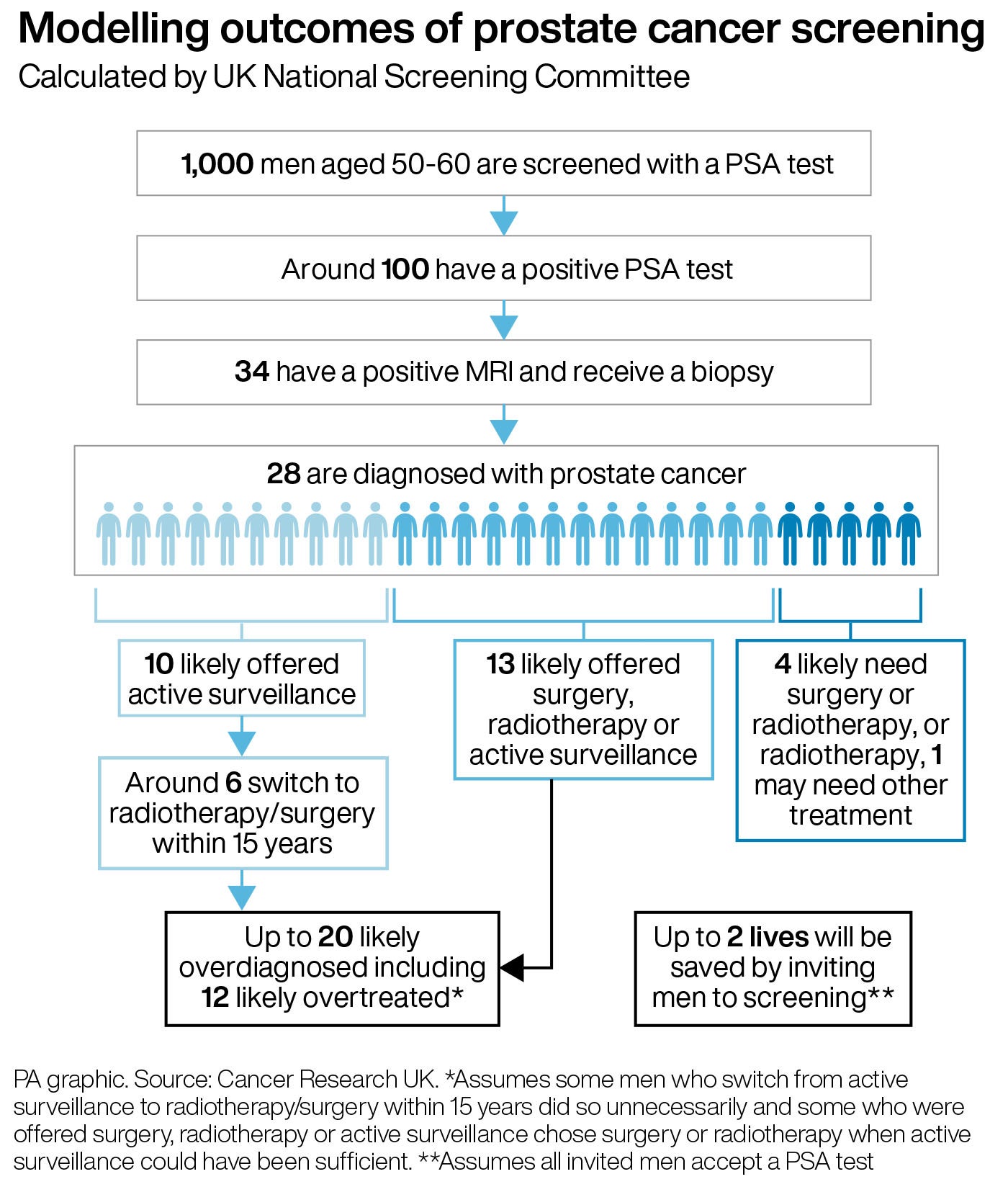- News
- Health
Health secretary Wes Streeting said he would consider the findings
Jane KirbyFriday 28 November 2025 15:44 GMTComments
 CloseDavid Cameron reveals his prostate cancer diagnosis
CloseDavid Cameron reveals his prostate cancer diagnosis
Sign up for our free Health Check email to receive exclusive analysis on the week in health
Get our free Health Check email
Get our free Health Check email
 Email*SIGN UP
Email*SIGN UPI would like to be emailed about offers, events and updates from The Independent. Read our Privacy notice
Prostate cancer screening should not be made available to the vast majority of men in the UK, a committee advising the government has said.
In a draft recommendation, the UK National Screening Committee (UKNSC) said it does not recommend population-wide screening using the prostate-specific antigen (PSA) test, because doing so would be “likely to cause more harm than good”.
Experts are waiting to see data from a large trial launched by Prostate Cancer UK last week, which aims to establish whether combining the PSA test with other tests, such as rapid MRI scans, could be a more effective protocol than that which is currently in place. The research could potentially lead to a recommendation for population-wide screening.
For now, the committee will only put forward a recommendation to screen men with BRCA1 and BRCA2 genetic mutations – which put them at far higher risk of prostate cancer – every two years, between the ages of 45 and 61.
Health secretary Wes Streeting said he would consider the findings, adding that, while he wanted to see earlier diagnosis and quicker treatment, this would need to be balanced against “the harms that wider screening could cause to men”.
Professor Sir Mike Richards, a former national cancer director and chair of the UKNSC, told a briefing that modelling shows that “whole-population screening may lead to a small reduction in prostate cancer deaths, but the very high levels of overdiagnosis” mean that the potential for harm outweighs the benefits.
Many high-profile figures, including Sir Tony Robinson and journalist Dermot Murnaghan, have expressed their “disappointment” at the decision.
 open image in galleryThe UK National Screening Committee has said it does not recommend population-wide screening using the PSA test (PA)
open image in galleryThe UK National Screening Committee has said it does not recommend population-wide screening using the PSA test (PA)Many experts argue that the PSA test is not very reliable, because men with a high PSA level may not have cancer, and some men with cancer have a normal PSA result.
A positive test result may lead to unnecessary treatment for slow-growing or harmless tumours, leaving men at risk of side effects such as incontinence and erectile dysfunction.
The UKNSC said on Friday that it would also not recommend extensive prostate cancer screening for Black men – who are at double the risk of the disease – because there is currently not enough data or evidence relating to this group. Neither does the committee recommend targeted screening for men with a family history of the disease, who are also at higher risk of developing prostate cancer.
The UKNSC said it would work closely with the Transform trial, launched last week by Prostate Cancer UK, to gather more data in these areas.
The trial is looking at the most promising screening techniques available, including PSA blood tests, genetic tests, and 10-minute MRI scans, and whether they can be combined to provide population-wide prostate screening.
It is hoped that the results will be ready within two years.
 open image in galleryThe UKNSC has modelled outcomes of prostate cancer screening (PA Wire)
open image in galleryThe UKNSC has modelled outcomes of prostate cancer screening (PA Wire)Laura Kerby, chief executive of Prostate Cancer UK, said: “The committee’s decision will come as a blow to the tens of thousands of men, loved ones and families who’ve fought for a screening programme. Today we’re deeply disappointed, but as determined as ever, and it won’t slow us down.
“People are sick and tired of seeing the men they love harmed by this disease, and we won’t rest until no man’s diagnosis is left to chance.
“We know that a mass screening programme could save thousands of men’s lives. While screening men with BRCA gene variations will save only a fraction of that, the committee’s decision is the first time they’ve recommended screening of any kind for prostate cancer.
“It shows that research and evidence can shift the dial and save men’s lives. And the research programme that could achieve screening for all men is already underway – our £42m Transform trial, which will bring new evidence back to the screening committee in just two years.”
Dr Ian Walker, executive director of policy at Cancer Research UK, said: “It’s good news that prostate cancer screening is being considered for men with faulty BRCA genes, which increase a man’s risk of developing an aggressive type of the disease. The UK National Screening Committee’s analysis shows that screening this group will save lives.
“We support the committee’s conclusion that for other groups of men, there isn’t currently enough high-quality evidence that screening would do more good than harm – it can miss dangerous cancers, and detect ones that don’t need treatment.”
 open image in galleryHealth secretary Wes Streeting says that while he wants to see earlier diagnosis and quicker treatment, that needs to be balanced against the potential harms (Getty)
open image in galleryHealth secretary Wes Streeting says that while he wants to see earlier diagnosis and quicker treatment, that needs to be balanced against the potential harms (Getty)Mr Streeting said: “I have always said I want to see screening in place for the most common cancer in men, provided this is backed by evidence. I want to change the NHS so it diagnoses earlier and treats faster. That aim will be balanced against the harms that wider screening could cause to men.
“I will examine the evidence and arguments in this draft recommendation thoroughly, bringing together those with differing views, ahead of the final recommendation in March.”
He said the government is providing funding to the Transform trial, “which has the potential to revolutionise prostate cancer screening, cutting out harmful side effects and making screening far more accurate”.
Around three in every 1,000 men have BRCA 1 and 2 mutations. The UKNSC said it is working with the NHS on ways to find those men who may be carriers.
At present, men may become aware that they have the faulty gene when a woman in their family with breast cancer tests positive for BRCA.
Prof Richards said: “There are existing guidelines on who should get that [BRCA] testing, and I think we will make those probably more prominent during the consultation process.” He said that men with a strong family history of prostate cancer can still get a PSA test via their GP, but that more data is needed to justify widespread testing of men with this history, and for widespread screening to be introduced for Black men.
 open image in galleryMore than 63,000 men are diagnosed with prostate cancer annually in the UK, with over 12,000 dying from the disease each year (Getty/iStock)
open image in galleryMore than 63,000 men are diagnosed with prostate cancer annually in the UK, with over 12,000 dying from the disease each year (Getty/iStock)The charity Prostate Cancer Research described the recommendation as a “missed opportunity”, and said that the “historical harms” associated with screening (such as unnecessary biopsies) have been dramatically reduced by modern “MRI-first techniques”.
Its chief executive, Oliver Kemp, said: “Today’s decision to recommend screening to BRCA variant carriers does not go far enough. It is a missed opportunity for other high-risk groups, including Black men and men with family history.
“We are failing these groups, and entrenching inequalities further, by not providing them with the best chance of having their disease caught early – when they are more likely to survive. There is still time for the government to reconsider this decision for all high-risk men, as further delays will continue to condemn the lives of thousands more.”
Figures published by the UKNSC suggest that around 80 per cent of men whose prostate cancers are identified through PSA screening “would not benefit in terms of preventing prostate cancer deaths and [advanced disease]”.
Ros Eeles, a professor of oncogenetics at the Institute of Cancer Research, in London, said screening men with BRCA mutations would save lives. But she said that her institute recommends yearly screening, rather than every two years.
She added: “Men with the BRCA1 gene fault are more than three times as likely, compared with non-carriers, to have aggressive prostate cancers that are likely to grow and spread quickly.
“The risk of prostate cancer in BRCA2 carriers is more than doubled, as is the risk of aggressive prostate cancer, and they will develop prostate cancer at a younger age, on average.
“If you stop screening at 61 years of age, you miss nearly half of all cancers for BRCA carriers between 40 and 69 years.”
More about
Wes StreetingPSAProstate CancerMike RichardsJoin our commenting forum
Join thought-provoking conversations, follow other Independent readers and see their replies
Comments